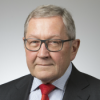Klaus Regling talks to Bloomberg TV
Transcript of Klaus Regling’s interview with Bloomberg Surveillance
Interviewers: Tom Keene and Francine Lacqua
18 April 2018
Bloomberg Surveillance: Angela Merkel will come to Washington DC on 27 April. What will be her goal when she meets the president of the United States?
Klaus Regling: I think we are concerned – and that is one of the themes of the IMF meetings – that trade might be negatively affected by some of the actions of the US government. Trade is a crucial stimulus for world growth, and we have seen during the last two years that, unlike during the crisis, world trade is again growing faster than world GDP, and that helps everybody to increase growth. But this is at risk if protectionism becomes widespread, and some measures that have been taken indicate that. Then we will all suffer; we will have lower growth, all of us.
Would you please explain for our audience the delicacy of a German running the European Central Bank? Why this debate on who will replace Draghi, and heaven forbid, it would be a German?
Well, I don’t know if that’s a correct characterisation. Don’t forget there were several months of very intense debate in the US before it was clear who would become the next Fed president. So this happens; markets are very interested to know who runs the big central banks, in the US, UK, euro area and Japan. There is always a debate on that. We are very happy to have Mario Draghi in place for another year and a half.
I’d like to remind our viewers what the ESM is. This was back in the heights of the Eurozone crisis in 2010, when the region created a financial backstop – the European Financial Stability Facility (EFSF); now it’s known as the European Stability Mechanism (ESM). What kind of role do the Germans want the ESM to have?
Let me say a few words about what we have done in the last seven years. Indeed, we were created as a new institution in the height of the crisis; it did not exist before the euro crisis. What we have done in the last seven or eight years is we have provided loans to five countries that lost market access, or were close to losing market access. And we have disbursed during those seven years €280 billion, so that’s more than 300 billion US dollars. And that made sure that the euro area stayed together, because the risk was that some countries could have been forced to leave the euro area. So that did not happen, that’s good; we have kept stability. And in the process, the five countries that received money from my institutions have implemented dramatic reforms. And that’s why they are among the best performing economies now in Europe. So we learned how to handle the crisis; that’s good. Now there’s a debate that the ESM might do more things. But I think we can look back quite satisfied.
What do you think the ESM will do? Will it become the European Monetary Fund? And would that have the backing of the Germans?
There’s a debate in our 19 member states, and these things are never easy in Europe because 19 independent countries have to agree, and they have to find a consensus. So that makes it so difficult – it’s easier to do dramatic steps in a crisis. Of course we are happy to be outside the crisis, but it means the urgency seems to be less, and it takes more time; there is a debate. But in general, our member states believe that the ESM should play a stronger role in the future, together with the European Commission, which also has an active role in case there’s a new crisis.
Do you think we will see a banking union and a capital markets union in our lifetime?
Absolutely, I have no doubt about that. Banking union started five years ago, the first two pillars of that are in place. We have a common European supervisor for the systemically important banks; that was a big step. We have a Single Resolution Fund; we are now discussing the backstop for that. We are discussing the need to have a European deposit insurance scheme. It’s controversial, but it’s not so controversial that we need it and we’ll get it one day. The question is how quickly we can implement it, because certain pre-conditions have to be in place, like sorting out legacy problems in certain banking systems. And that’s difficult; there are different views on that. But there’s not really a disagreement that we will ultimately have that. And if your question is whether we’ll see it in our lifetime, I’ve no doubt about that.
How important is it to the German people that they saw this management change at Deutsche Bank back to a German? How important was that change taken in Germany?
I don’t think that was the most crucial issue for the German public. Of course, Deutsche Bank is the biggest bank in Germany, and therefore there is an interest that it’s well run and well managed, that it’s profitable, because the German economy needs a big bank – that’s more important than nationalities.
Author

Contacts


